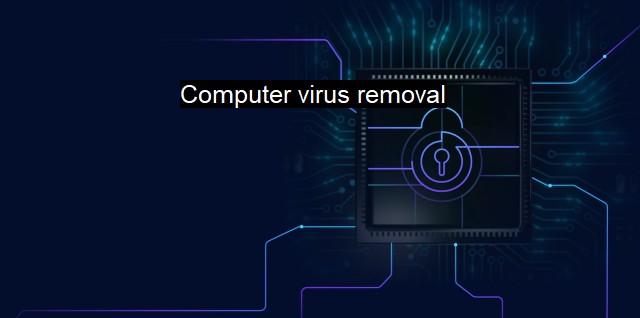What is Computer virus removal?
Computer Virus Removal: Essential Steps to Protect Your System from Cyber Threats
Computer virus removal refers to the process of identifying, isolating, and eliminating malicious software programs, typically referred as 'viruses', from a computer system. A computer virus is a code written with a purpose of altering how a computer operates by incorporating a piece of harmful code or series of codes, which when triggered, can potentially damage the computer system, steal sensitive information and even possibly take control of the overall computer operations. Viruses often make replicates of themselves and spread to other systems connected with the victim computer, causing severe disruptions.We often talk about preserving the integrity and security of information systems which include computer networks, devices, databases and sensitive information, all resident or interacting with these systems. A computer virus, acting as a potent cybersecurity threat, jeopardizes the safe operations of such systems by presenting numerous security risks. An infringement which bypasses the guard of antivirus programs and slips into the system can lead to various threats such as exposure of sensitive data like credit card information, personal IDs, and passwords, defacement of the user interface, unnecessary popups, spamming to the connected networks, or in a much-destructive scenario, total breakdown of the computer system.
The computer virus served as an ubiquitous threat that can permeate into any system, bases importance of 'Antivirus Programs'. Antivirus programs are specialized software that continuously monitor the computer activity, scanning files for any signs of malfeasance. Using updated defined lists of known viruses and their behaviors (known as virus definitions), the antivirus software checks each file that enters the system, such as files downloaded from the internet, email attachments, and system files updates.
The virus removal process begins the moment a virus is detected. The antivirus software will isolate the malicious program to prevent it from spreading. After isolation, the virus is deleted, and, if necessary, any damaged files repaired. Today’s powerful antivirus software is capable of repairing corrupted files, thereby minimizing any potential lost data or damage to the computer system integrity.
An interesting feature that most antivirus tools employ is the scheduling of periodic scans. This automatic preset scan happens with no user intervention, thereby ensuring constant vigilance and prevention from the spread of viruses even when the system users may forget to check. At the time of such scans, should a risk overcome the preliminary shields and seep into the system, the antivirus software quickly mounts a defense by isolifying and then deleting such threats.
Technologies of antivirus software have evolved, giving rise to layers of protections like firewall features, real-time protection, and cloud-based detection, making it difficult for the viruses to break through defenses and initiating a consistent process of computer virus removal.
While antivirus programs help mitigate the risks, it is important to maintain good cyber hygiene, making a warranty for data theft prevention, keeping software and operating systems up-to-date, often changing strong passwords, and ensuring general preventive practices.
Computer virus removal forms a critical facet of cybersecurity. Through antivirus software capable of detecting, isolating, and eliminating these dangerous programs, users and organizations can ensure the safety, privacy, and integrity of their computer systems. despite advancements in antivirus technology, maintaining an attentive, proactive approach to cybersecurity is crucial as new and more sophisticated viruses continue to emerge. A sound understanding of the need, mechanism, and maintaining strong cyber hygiene practices can provide all computer users- individual or corporate, with an overarching shield that strongly stands out against computer viruses.

Computer virus removal FAQs
What is a computer virus?
A computer virus is a piece of malicious software that can replicate itself and spread to other systems. It can damage your computer or steal your personal information.How can I tell if my computer has a virus?
Some signs that your computer may be infected with a virus include slow performance, pop-up ads, files disappearing, and programs opening or closing on their own. You may also receive messages from your antivirus software alerting you to a virus.How can I remove a virus from my computer?
The best way to remove a virus from your computer is to run a reputable antivirus program. Make sure your antivirus software is up to date, and run a full scan of your computer. You may also need to manually remove any suspicious files or programs.How can I prevent my computer from getting a virus?
You can prevent your computer from getting a virus by installing reputable antivirus software and keeping it up to date. Be cautious when downloading and opening files or attachments from unknown sources, and avoid clicking on suspicious links. Keep your operating system and software updated with the latest security patches.| | A | | | B | | | C | | | D | | | E | | | F | | | G | | | H | | | I | | | J | | | K | | | L | | | M | |
| | N | | | O | | | P | | | Q | | | R | | | S | | | T | | | U | | | V | | | W | | | X | | | Y | | | Z | |
| | 1 | | | 2 | | | 3 | | | 4 | | | 7 | | | 8 | | |||||||